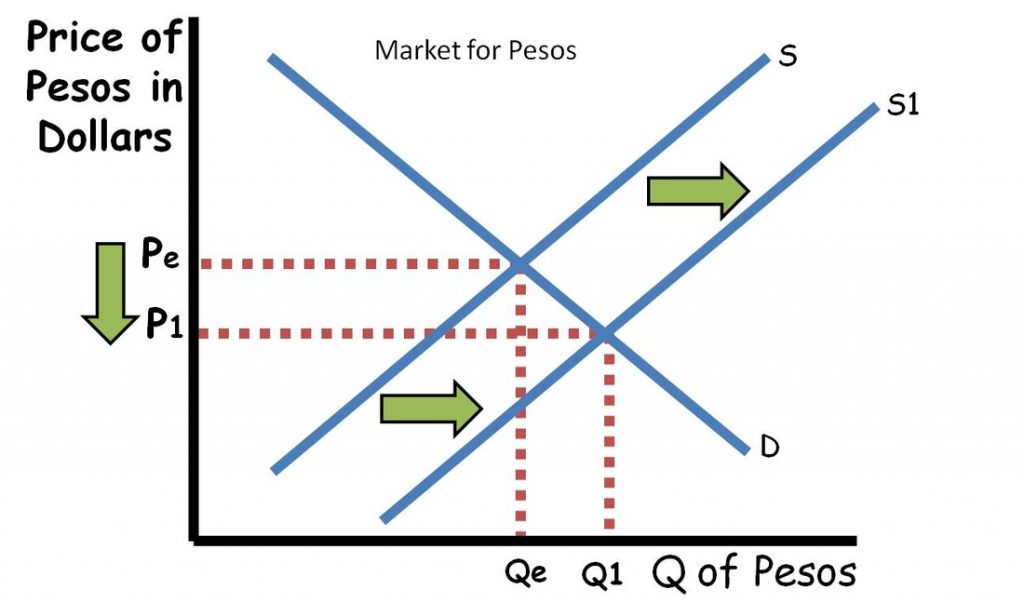What are foreign exchange market example - As the foreign exchange market (forex market) takes center stage, this opening passage beckons readers with casual formal language style into a world crafted with good knowledge, ensuring a reading experience that is both absorbing and distinctly original.
The forex market, a global marketplace where currencies are traded, plays a crucial role in international trade and finance. Individuals and businesses alike engage in forex transactions for various purposes, including facilitating cross-border payments, hedging against currency fluctuations, and speculating on currency movements.
Foreign Exchange Market Definition
The foreign exchange market, also known as forex or FX, is a global decentralized market for the trading of currencies. It is the largest financial market in the world, with an average daily trading volume of over $5 trillion. The forex market allows individuals, businesses, and governments to exchange currencies for various purposes, such as international trade, investment, and hedging against currency fluctuations.Role in International Trade, What are foreign exchange market example
The forex market plays a crucial role in facilitating international trade. When businesses import or export goods or services, they need to convert their currency into the currency of the country they are trading with. The forex market provides the platform for this currency conversion, ensuring smooth and efficient transactions between parties in different countries.Usage by Individuals and Businesses
Individuals and businesses use the forex market for a variety of purposes. Individuals may exchange currencies for travel, education, or investments abroad. Businesses use the forex market to manage their foreign exchange risk, speculate on currency movements, or hedge against currency fluctuations.Types of Foreign Exchange Market Participants
 The foreign exchange market is a global decentralized market for the trading of currencies. It involves various participants who play different roles in facilitating currency exchange.
The foreign exchange market is a global decentralized market for the trading of currencies. It involves various participants who play different roles in facilitating currency exchange. Major Participants
The major participants in the forex market include:- Central Banks: Central banks are responsible for managing the monetary policy of their respective countries. They intervene in the forex market to influence exchange rates and maintain economic stability.
- Commercial Banks: Commercial banks facilitate currency exchange for their clients, including individuals, businesses, and other financial institutions. They act as intermediaries between buyers and sellers of currencies.
- Retail Traders: Retail traders are individuals who trade currencies on a smaller scale for speculative purposes or hedging against currency risks.
- Institutional Investors: Institutional investors, such as hedge funds, pension funds, and investment banks, participate in the forex market to manage their investment portfolios and hedge against currency fluctuations.
Impact of Institutional Investors
Institutional investors have a significant impact on the forex market due to their large trading volumes and sophisticated trading strategies. They can influence exchange rates by buying or selling large amounts of currencies. Additionally, their trading activities can contribute to market volatility and liquidity.Foreign Exchange Market Instruments
The foreign exchange market facilitates trading in various financial instruments, each with unique characteristics and applications. These instruments enable market participants to manage currency risk, speculate on exchange rate fluctuations, and facilitate international trade and investment.
Spot Transactions
Spot transactions involve the immediate exchange of currencies at the prevailing market rate. They are typically settled within two business days and are used for immediate settlement of obligations or to take advantage of short-term exchange rate movements.
- Advantages: Immediate settlement, low transaction costs.
- Disadvantages: Limited flexibility, exposure to exchange rate fluctuations during the settlement period.
Forward Contracts
Forward contracts are agreements to exchange currencies at a predetermined rate on a future date. They allow market participants to lock in exchange rates for future transactions, mitigating the risk of adverse exchange rate movements.
- Advantages: Protection against exchange rate volatility, flexibility in setting the settlement date.
- Disadvantages: Potential for losses if the market rate moves favorably, counterparty risk.
Currency Options
Currency options give the buyer the right, but not the obligation, to buy or sell a specified amount of currency at a predetermined price on or before a certain date. They provide flexibility and the potential for limited risk.
- Advantages: Flexibility, limited risk, potential for profit.
- Disadvantages: Premium cost, potential for losses if the option is not exercised.
Factors Influencing Foreign Exchange Rates
Foreign exchange rates are influenced by a complex interplay of economic and political factors. These factors affect the supply and demand for currencies, ultimately determining their values in the market.
Key economic factors include:
Interest Rates
Interest rates offered by a country's central bank impact the value of its currency. Higher interest rates make a currency more attractive to investors seeking higher returns, increasing demand and leading to currency appreciation.
Inflation
Inflation is the rate at which prices rise within an economy. High inflation erodes the purchasing power of a currency, making it less desirable and leading to depreciation.
Political Stability
Political stability and economic policies influence investor confidence in a country's currency. Political turmoil or uncertain economic policies can lead to currency depreciation as investors seek safer havens.
In addition to economic factors, political factors such as trade policies, international relations, and geopolitical events can also affect exchange rates.
Explore the different advantages of foreign exchange rates market kenya that can change the way you view this issue.
Foreign Exchange Market Trading Strategies

The foreign exchange market offers various trading strategies to cater to different risk appetites and time horizons. Understanding these strategies is crucial for successful forex trading.
Scalping
Scalping involves executing multiple trades within a short period, aiming to capitalize on small price fluctuations. Scalpers hold positions for seconds or minutes, focusing on quick profits with minimal risk.
Day Trading
Day traders enter and exit positions within the same trading day. They analyze market trends and place trades based on short-term price movements. Day trading requires close monitoring of the market and quick decision-making.
Discover the crucial elements that make understanding foreign exchange market the top choice.
Swing Trading
Swing traders hold positions for several days or weeks, aiming to profit from larger price swings. They identify market trends and trade accordingly, holding positions until the trend reverses.
Browse the multiple elements of foreign exchange market supply and demand to gain a more broad understanding.
Risk Management and Technical Analysis
Effective forex trading involves managing risk and utilizing technical analysis. Risk management strategies, such as stop-loss orders and position sizing, help mitigate potential losses. Technical analysis, which involves studying price charts and indicators, provides insights into market trends and potential trading opportunities.
Risks and Rewards of Foreign Exchange Trading
 Foreign exchange (forex) trading offers the potential for substantial profits, but it also comes with significant risks. It is crucial to understand these risks and manage them effectively to succeed in forex trading.
Foreign exchange (forex) trading offers the potential for substantial profits, but it also comes with significant risks. It is crucial to understand these risks and manage them effectively to succeed in forex trading. Potential Risks
Forex trading involves several inherent risks, including: - Currency fluctuations: The value of currencies constantly fluctuates, which can lead to losses if the market moves against your positions. - Leverage: Leverage, a tool that allows traders to increase their exposure to the market, can amplify both profits and losses. Misusing leverage can lead to significant financial losses. - Market volatility: Forex markets can experience high levels of volatility, resulting in rapid and unpredictable price movements. - Economic and political events: Global economic and political events can significantly impact currency values, potentially causing losses. - Emotional trading: Trading based on emotions, rather than sound analysis, can lead to poor decision-making and losses.Leverage and Its Impact
Leverage is a double-edged sword in forex trading. While it can magnify profits, it can also amplify losses. For example, using 100:1 leverage means that a 1% movement in the underlying currency pair will result in a 100% gain or loss in your trading account. It is essential to use leverage wisely and only within your risk tolerance.Managing Risk
Effective risk management is crucial in forex trading. Traders should: - Understand their risk tolerance: Determine the maximum amount of loss they can withstand before entering a trade. - Use stop-loss orders: Set stop-loss orders to automatically close losing positions at a predefined price, limiting potential losses. - Control emotions: Avoid making trading decisions based on fear or greed. Stick to a disciplined trading plan and manage emotions effectively.End of Discussion: What Are Foreign Exchange Market Example
In conclusion, the foreign exchange market is a dynamic and complex ecosystem that underpins global commerce and financial stability. Its participants, instruments, and influencing factors create a fascinating landscape for those seeking to understand the intricacies of currency trading.
